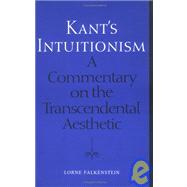
What is included with this book?
| Kant's representation terminology | |
| The distinction between intuition and understanding | p. 28 |
| The distinction between form and matter of intuition | p. 72 |
| Sensation and the matter of intuition | p. 103 |
| Origins of the form and the matter of intuition | p. 135 |
| The expositions | |
| The first exposition | p. 159 |
| The second exposition | p. 186 |
| The later expositions | p. 217 |
| The transcendental expositions | p. 253 |
| Conclusions from the above concepts | |
| Kant's argument for the non-spatiotemporality of things in themselves | p. 289 |
| The unknowability thesis and the problem of affection | p. 310 |
| Kant, Mendelssohn, Lambert, and the subjectivity of time | p. 334 |
| Table of Contents provided by Blackwell. All Rights Reserved. |
The New copy of this book will include any supplemental materials advertised. Please check the title of the book to determine if it should include any access cards, study guides, lab manuals, CDs, etc.
The Used, Rental and eBook copies of this book are not guaranteed to include any supplemental materials. Typically, only the book itself is included. This is true even if the title states it includes any access cards, study guides, lab manuals, CDs, etc.